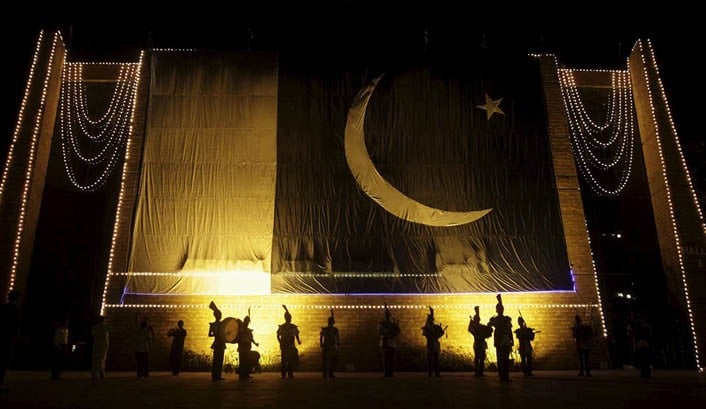
Revisiting some dreams on the eve of Independence Day

On the eve of the 70th anniversary of our independence, one feels like revisiting some of the dreams people had, back in August 1947. The struggle for independence and for creation of Pakistan did not have a single dream by Allama Iqbal, as purported by our history textbooks. Rather, it appears in retrospect that different classes had separate dreams of their own.
The question about what those dreams were and how many of them have been realised, deserves some analysis. To begin with, the common Muslims striving for Pakistan had a dream about a welfare state.
They were dreaming less about a theocracy, if at all, and more about a dispensation that would ensure health and education facilities for their families. They were dreaming about potable water coming into their homes and an effective sanitation system taking the effluent out. The common Muslim struggling for Pakistan must have dreamt about uninterrupted electric power brightening their lives. They were dreaming about networks of clean and tidy roads and highways connecting their villages and towns in their new homeland. Common Muslims, on the eve of independence, must have expected safe and secure communities for them in the ‘promised land’. They were dreaming about good governance with justice without hassle.
If the common Muslims were dreaming about these things, other classes had divergent scenarios appearing before them. For example, the feudal lords and land owners living in this region had a dream about thwarting any attempts for land reform. Land redistribution had no place in their ideal land.
The Indian National Congress had announced immediate land reforms in India but a similar announcement was an anathema to the Muslim landed gentry in Pakistan. While India did impose restrictions on the extent of land property, this never materialised in Pakistan. The dream of landlords in Pakistan did come true, and they still own thousands of acres of land, albeit in different names.
Similarly, Muslim capitalists had their own dreams about eliminating competition from non-Muslim capitalists and industrialists. They knew that in united India they had slim chance of dominating commerce and industry in the presence of capitalists such as the Tatas and Birlas. Muslim capitalist in Pakistan was dreaming about a land without a non-Muslim competition where the new country would be entirely dependent on their will. They would invest and earn loads of profit.
The dreams of the Muslim civil and military bureaucracy were revolving around the top positions in the state hierarchy. They were dreaming about no competition from non-Muslim candidates in the new state apparatus. Now it would be much easier for them to reach the topmost echelons of power. And this dream was realised pretty soon.
Just imagine General Ayub Khan in a united India, where he would have never become the commander in chief and could never elevate himself to the position of a field marshal of god knows what. Neither could he declare himself president of the country thanks to his uniform.
All this became possible in Pakistan because the civil and military bureaucracies were able to realise their dreams that would have remained unattainable in united India.
Muslim religious leaders had dreams of their own. Even those who had opposed the creation of Pakistan, now pinned their hopes on this land of the pure. Once Pakistan became a reality the religious and sectarian outfits in the country started dreaming about a theocratic state. They foresaw and strived for a theocracy that would be dominated by their religion and sect. They dreamt about a country where every aspect of society would be coloured with their own religion and sect.
The dreamland of the mullahs would have no escape from increasing religiosity at every step. The common people would be tied with sectarian straightjackets. Alas, that dream also came true.
The politicians of the Muslim League, on the other hand, saw their own dreams. They did not want to compete with secular and liberal political parties. Especially the first constituent assembly that came into being tried its best not to draft a constitution because by doing so the assembly would have dissolved itself. Most assembly members feared that they would not be elected in the new elections that’s why they tried to make the constitution making process as lengthy as possible.
The left-leaning liberal and secular politicians, including the communists, had their own dreams. The Communist Party of India had supported the creation of Pakistan, terming it a movement for national self-determination -- a term frequently found in the Leninist-Marxist literature. They must have dreamt about an early socialist revolution in Pakistan that would kick start Pakistan’s journey towards communism under the Soviet umbrella. Their dream became sour soon after the creation of Pakistan when they became the primary target of the new state machinery, and the mullahs who had opposed Pakistan had a field day.
To conclude, if we look back we see that the dreams of the common people were not realised as opposed to the dreams of most others coming true. People still crave for basic health and education facilities but the feudal lords and landed elite still occupies vast tracts of land. Potable water and sanitation remain a dream but the capitalists and industrialists have been eating up loans at the public expanse and throwing industrial wastes into the water channels that were once sources of potable water. Uninterrupted and affordable electric power remains a dream for common people but the civil and military bureaucracy has developed islands of prosperity for themselves.
And so, we celebrate the 70th birth anniversary of Pakistan with another ousted prime minister on the roads and waiting for his fate to be decided not by the people of Pakistan -- whose dreams never materialised -- but by those selected cogs of state machinery whose all dreams have come true.